
ROULETTE BANKROLL MONEY MANAGEMENT
(Todd: The key to winning in the casinos is a good money management system. If you handle your money properly you can beat the house. Most gamblers don’t know this secret.)
Sorry, Todd, what you said sounds right, it even sounds somewhat logical, but it is wrong. Over time you can’t beat a negative expectation game (meaning a game where the house has the edge) by handling your money in some clever fashion.
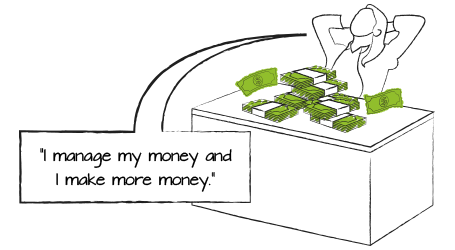

THE TRUTH ABOUT ROULETTE BANKROLL MONEY MANAGEMENT
No money management system, no layout betting strategy, can overcome the reality of how the casinos structure their games. The reality is that the casinos have the edge; the gambler gambles, the casino structures the games to their benefit using math. Math money ultimately beats gambling money. It’s the way of the world.
What you can do at roulette is manage your money in such a way that the house edge is not hammering away on as many decisions. The more decisions you play, the better chance you will be losing.
Check out my strategies in this guide and you will see that almost all of them reduce the hit of the house edge owing to the fact that the player is betting less money over time.
However, I have given strategies that allow you to fully enjoy the thrill of anticipation without churning too much in the agony of major defeats.
Money management does count in a somewhat different way.

WHAT’S GOOD ABOUT ROULETTE BANKROLL MONEY MANAGEMENT
If you manage your money properly you can stretch that money over time the way Mr. Fantastic stretches his body in the Fantastic Four. Yes Mr. Fantastic is mortal and your money is mortal too. Very few roulette players have an unlimited bankroll.
Since most players don’t have such inexhaustible funds, their money is limited by the demands of everyday life. It is wise for them not to throw their money away by playing foolishly. (“I need a heart operation. Oh, screw it; put my bank account and my house on red!”) Plenty of aristocrats learned that lesson the hard way.



THE 401G
(The Captain: Do not gamble with the money you need for household bills or personal expenses. If you want to gamble you must use money reserved only for that activity. A gambler should have two bankrolls; one for life and one for the pleasure of courting Lady Luck. Those two bankrolls should never intersect.)
The late Captain, a legendary Atlantic City player, was my mentor from the very first time I entered a casino until this very second as I write this section. He taught me; he inspired me. He knew gambling better than anyone I ever met.
The Captain had insightful ideas about money management, one of which I referenced above.
He would always say that a player can’t gamble with a free soul or a free conscience if the player used what the Captain called “desperate money.”
Desperate money is money needed for all things other than gambling, such as your daughter’s college fund.
“Keep a separate bankroll for gambling,” was his advice and he was so right. With a separate bankroll – a non-desperate bankroll – you can gamble and, if you lose, not have it hurt you where you literally live which is where, obviously, you literally live.
In order to do this I developed what I call my idea of a 401G, which is a bank account that has money used strictly for gambling.
Now I don’t care how rich you are or how middle class you are, a 401G account will make sense for you. In the United States a 401K account is usually a retirement account. In the 401G, the “G” stands for gambling.

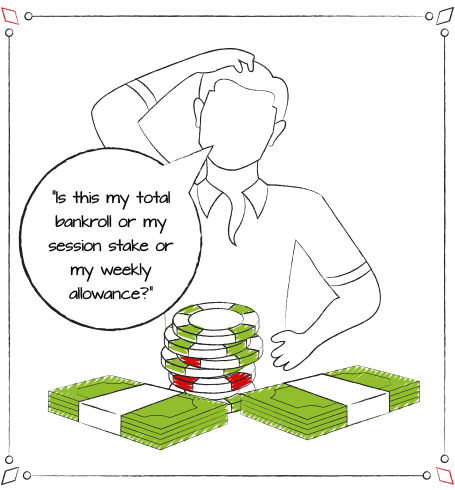
GETTING STARTED WITH THE 401G
If you have a boatload of money, so much so that your couch cushions and bed mattresses are stuffed with gold and silver, then dig into them and take some handfuls and set up your 401G.
If you are a working stiff and/or own your own business, then start to set aside an amount each week or each month that will not be missed from your real life and put that amount into your 401G.
So how much should you put there? I would say – a small amount on a regular basis for the rest of your gambling life. Since you are playing a negative-expectation game you will constantly need to contribute to your fund.
Let us say that your bet is 10 units then you should put in maybe 100 units a week or month and this just becomes a normal deposit. After six months of monthly deposits you will have a minimum of 600 units and that is when you go to the online casino to play, not before.
You might also put in 100 units a week – you have to decide this for yourself. But remember, Little Lulu might need braces and your son Tum-Tum might need bail money so do not take any real money from real life to pay your 401G.

TOTAL ROULETTE BANKROLL AND SESSION STAKES
Your bankroll should be divided as follow:
- Session stake is what you use for one sit-down at the game. The session can last however long you wish; an hour, two hours or until you lose your stake, or win so much money you buy the casino.
- Daily stake is how much you will give yourself for playing two or several sessions. Usually it is just multiplying your session stake by how many sessions you plan to play.
- Weekly stake is how much you will give yourself for a vacation to a casino town.
- Bankroll is the total amount of money in your 401G. Hopefully this should grow with routine deposits.

KEY ELEMENTS
- It is important to keep your gambling money separate from your “regular” money that you use for life expenses such as housing, food, clothes and buying my books.
- Set up a 401G which is a bank and/or a checking account strictly for your gambling funds. Never use money other than from this fund for playing.
- our money should be divided using the concept of session stake, daily stake, weekly (or longer) stake.


THE ENVELOPE METHOD OF MONEY MANAGEMENT
This technique is often laughed at by players and gambling gurus who laugh at things that often make sense and shouldn’t be laughed at.
When you go to a casino, especially if you are staying over for a night or two or 10, bring some envelopes with you. After you finish a session whatever money you have – be it small or medium or a huge amount – put it in the envelope because you are now finished with that session stake.
Your next session will come from a new stake. This envelope technique is a control factor as it (I pray) will tend to stop players from dipping into their past money, be that wins or just what’s left over from a losing session.
I know this for a fact; it is nice to finish a gambling session with some money, even if it isn’t a win. Like a fight, such a loss is on points as opposed to a knockout – which would be losing your entire session stake.


SESSION STAKE AND ROULETTE BANKROLL
(The Captain: You want a small bet to a large bankroll so that no loss will be devastating. The larger the distance between your bet and your total bankroll will mean the larger the distance between feeling awful and feeling “well, okay, I lost tonight. I’ll get them next time.”)
You’ll note above that I used a 10 unit bet into a 400 unit for a session stake. I’d love to see a 401G plan with an 8,000 unit bankroll or an even larger one. The more in the plan the less a loss will lose you sleep.
My opinion is that the minimum spread of units should be one to 40 or more if you are the cautious type (I am the very cautious type). If your session sees you lose that 40 units then that’s it until the next session – but do not make that next session mere minutes after the last one. Give yourself hours or maybe even days.
Always keep putting money into your 401G. It is a great gift for your peace of mind.


PATTERNS OF WINS AND LOSSES
I am an outside bettor and my one to 40-unit betting spread works best with the outside even-money bets. While the same house edges on the inside and outside bets will drain money from you at the same percentages, they do so in different ways and over different time periods. Their patterns of wins and losses are not the same.
It would not be unheard of for you to bet 10 units on one inside number and find that you do not win a spin in forty decisions. It could also be the opposite; you win early and cart home a tank load of money. This is called variance as in the “ups and downs” of playing. No player can escape variance.
Remember that you are facing 37 to 1 or 36 to 1 odds on an inside number – so the times between wins could be long and losing decisions. These you have to be able to withstand emotionally and economically.
If you wish to bet more than one number, then it might be best to go with propositions since you can bet far less than using inside numbers straight up.


WHAT IF I FIND A REAL BIASED WHEEL OR A REAL DEALER SIGNATURE?
(Margaret: I would love just once in my life to play a biased wheel. I would be forever thankful. I once tried to make a deal with the Lord. I said let me just once whack the casino so hard it hurts them. In my mind I was thinking that would be on a biased wheel. It hasn’t happened yet.)
Things change when you are playing with an advantage. Now, you are not interested in a session stake since you have the edge. You are interested in being able to last a long – maybe a very long – time. You will probably win over such a period of time and this is the only time to take a truly aggressive long range approach.
With advantage play you will bet the numbers that are coming up, either in whole sections or as individuals. Make sure you have enough money to last through whatever dry spells you experience – and you will experience some dry spells.
Do I think most of you reading this guide will hit a biased wheel? Sadly, no, I don’t. I don’t really think I will ever find another one either.
Please remember in my over quarter century of casino gambling I hit one biased wheel just once. I guess you could say the Lord answered Margaret’s prayer except he answered it for me. Some people “can’t always get what they want” sang the Rolling Stones and I guess that holds true for Margaret.

KEY ELEMENTS
- Although the house has the same edge on all bets (with some exceptions for games with surrender and en prison) the patterns of wins and losses are different for “inside” and “outside” bets.
- The “inside” bets are more dynamic – with large wins and many losses.
- The “outside proposition” bets tend to be less dynamic with more of a back and forth between player and casino.
- Your session stake for “inside” bets should be larger than your session stake for “outside proposition” bets to cover long losing streaks.


SAYING SAYONARA
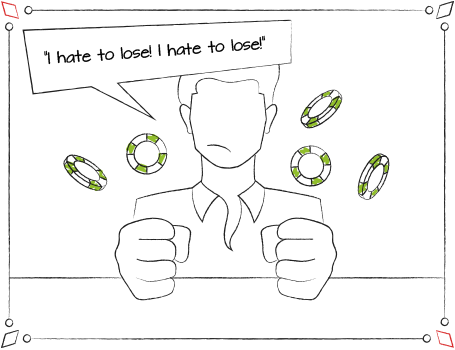
Other than playing a biased wheel or dealer signature (these are truly the unicorns of roulette) every player has to exercise discipline. You are playing for fun and while you might get a profit now and again, you know as I know – as almost all casino gamblers know – that the house will more than likely win.
Life might not be predestined as the Calvinists believed but casino gambling predestines just about all the players to defeat. How much you lose is up to you. That’s where your true freedom lies – you determine what you can afford and you should have the common sense to make sure you do not get caught up in what I have named the “catch up” cycle.
There is a real tendency on the part of the losing gambler to want to win back the money he’s lost and win it back fast. Think of the Martingale, a system that attempts to do just that. Getting caught in the “catch up” cycle will often end in a bigger disaster.
If you lose your session stake, accept the defeat, take a break and come back to fight another day. That is the sensible way to approach roulette or any other casino game.


SCAMMERS
This is the second to last element in this guide, but certainly not the least element (the least is coming next) are the scammers; people who attempt to con you into buying betting strategies that they swear will work. These are universally betting systems just like the strategies I discuss in this guide – systems that can’t beat the house edge.
Please memorize this: Betting systems cannot beat a negative expectation game – unless that betting system is hooked into an advantage play such as blackjack card counting, dice control at craps, positive expectation video poker, advantage slots, biased wheels and the like.
Naturally the truth does not set the readers free. Many players will cough up their hard-earned money for a host of systems with a host of names all of which resemble systems that have been used for centuries. There are so many Paroli systems that it should become a franchise. The same should hold true with Gamblers Fallacy systems and Martingale systems.
If you wish to properly manage your money an important step is not to throw it away on a system that does not give you the edge. There are plenty of fun systems to play and all of these can be found in normally priced books and on the Internet. Just use this guide and you have them all – and you have them in a way to adjust them to your particular concept of how to play, as long as that concept is same.

WHAT IF I FIND A REAL BIASED WHEEL OR A REAL DEALER SIGNATURE?
How are scammers generally known? Their advertisements are long – really, really long – so that you are being hammered for a significant amount of time with the greatness of the system.
Here is a list of typical scammer techniques:
- The Profile of the Scam and Scammer
- There will be plenty of testimonials from people praising the system in no uncertain terms – people who may or may not actually exist. (“This strategy is better than a fine wine with a beautiful companion who hungers for my lard-laced body,” states Jimmy “Jumbo-Jelly-Belly” James.)
- There will be plenty of anecdotal “evidence” supplied by the scammer. For example, how the scammer is now residing on his own island. (Full disclosure: I fell for this one when I bought the “secret slot dowsing rod” in 1990. Look, I wanted my own island because Manhattan was just too darn crowded.)
- The scammer will offer a money-back guarantee if you are not satisfied. Almost none will honor such a guarantee or they will disappear after several months of selling their guaranteed system. Just try to find them. (Maybe they are residing on their island?)
- The system will often be called “foolproof” as if anything can be proof against a fool. No betting system can.
- Some scammers now claim their system can beat Internet roulette games run by an RNG. No way! These roulette games are actually slot machines in the guise of roulette.
- One more time: The advertisements, particularly those on the web or through the mail, will be long winded, page after page after page. Salesmen know that the longer they can keep a potential customer involved the easier it will be to hook him or her.
In short, be leery. Systems sellers not only exaggerate; they lie – and they lie in wait for those whom they think they can con. Don’t be among that group.

KEY ELEMENTS
- The world of roulette (and the world of all casino games) is filled with scammers selling betting systems which are exactly like or variants of the systems discussed in this book.
- No betting system can beat the house edge on a random game and anyone who claims their betting system can do that is dreaming or lying.
- Long advertisements with many testimonials from people who supposedly tried the betting method and won or won a lot or won so much they can afford their own island.


ROULETTE CASINO COMPS
Casinos want four hours of table-game action per day for full comps. Most players are more than happy to give it to them. Indeed most players are more than happy to give much more time to playing the games which of course makes the casinos very happy. If your goal is to make the casinos happy then play seemingly endless hours per visit.
How casinos figure their comping rules is relatively easy to understand. It goes like this (or something close to this):
Playing four hours a day of negative-expectation games such as roulette can be quite costly and rarely are those “free” meals, rooms and shows worth the money you actually lose to get them.
Let’s use roulette as our example:
40 decisions per hour X 10 units X 4 hours of play = 1600 total units wagered X .0526 house edge = 84.16 units as the theoretical loss per hour on an American wheel.
Most casinos will give back between 30 and 50 percent of a player’s theoretical loss in comps so our above roulette player could get between 25 units and 42 units in comp value.
Obviously a bigger bettor will get bigger comps.
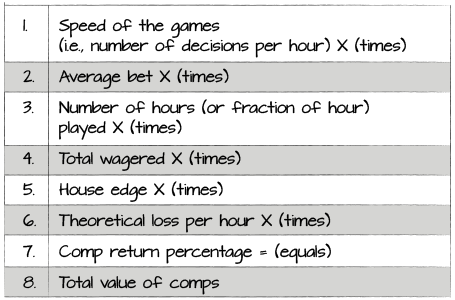

(Word of Advice: A theoretical loss is the mathematical “speculation” as to how much a player is expected to lose in an hour or more, but in reality the player could win money, lose less money than the theoretical or lose more money than the theoretical. The casinos operate on the math of the games and that is how they usually figure out the comp value of someone’s play. With so many players playing that theoretical is usual right on the button.)

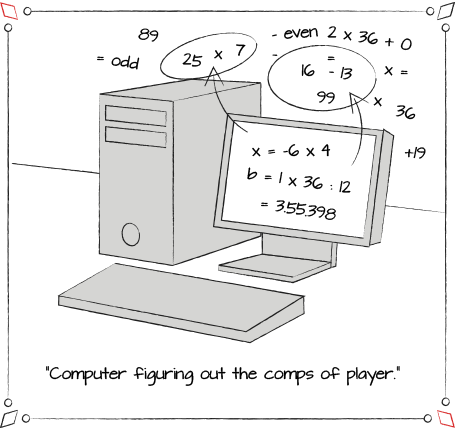
ASK AND YOU SHALL (MAYBE) RECEIVE
How do you know how much a given casino will actually give you based on your style of play? Ask them! Tell the floor person or pit person or your host everything about your play and how you bet and then say, “What comps will you give me for this?”
The floor person will probably punch your play into a computer, Most casinos nowadays are computer driven and individual workers, even bosses, have little say about what you do or don’t get. Chances are the computer will spit out, “This man is wonderful or this woman is delightful. Give the whole casino as a comp!”
Fantasy aside, the computer will make a decision as to your worth to them, meaning how much they expect you to lose and project a comp range.
And how should you play? Use systems from this guide; take your time, and whatever the casino gives you it gives you. Do not play for comps.

KEY ELEMENTS
- The casinos judge what kind of comps they will give players based on the player’s theoretical loss.
- A theoretical loss is what a player’s style of play will predict. Players might win more or lose more than the theoretical loss.
- To find out what your play is worth do not hesitate to ask a pit boss or host what that particular casino is looking for.


Quiz
1. Why can’t money management give the player an edge over the game of roulette?
2. What is a 401G?
3. What is a session stake?
4. What is a daily stake?
5. What is a weekly stake?
6. What is a bankroll?
7. What is the general pattern of wins and losses on the inside wagers?
8. What is the general pattern of wins and losses on the outside proposition wagers?
9. How is money management different when actually playing with an advantage as opposed to playing at a disadvantage?
10. Scammers are generally selling variations of what traditional betting systems?
11. What does it mean that comps are based on “theoretical” losses?
12. How do you know what kind of comps you can get for your play?
ANSWERS
1. The house edge has nothing to do with a player’s money management system. A winning bet for the player will still see the casino not pay back true odds or the player will lose more decisions.
2. A 401G is a special bank account for gambling money. It is not money to be used for anything but playing casino games.
3. A “session stake” is the amount of money you will give yourself to play a single session. The length of time for such a session is up to the (sane) player.
4. A “daily stake” is merely the session stakes times how many sessions you intend to play in a single day.
5. A “weekly stake” is how much money you intend to play in a longer visit to the casino.
6. A “bankroll” is the total money you have in your 401G.
7. “Inside” wagers tend to be explosive with those 35 to 1 payouts. You can be up and down a lot. There are far more losses on inside wagers but also big hits that do occur. You need to be able to weather the storm by having enough money for your sessions. In the end the house edge will be extracted from the total amount you wager.
8. The “outside proposition” bets tend to be far less explosive. The general pattern is to win some, lose some but over time to be down the house edge. This type of betting tends to allow players to last longer at the game.
9. When you play with an advantage you are now playing against your entire 401G. You play for as many hours as you can as long as you see your bankroll gradually increasing. But you must keep your betting restrained because even with the edge you will suffer losses too.
10. Scammers tend to sell variations of the Martingale, Gambler’s Fallacy or Paroli systems.
11. Based on the math of how you play the casino figures out what you should probably lose over time and that is known as your “theoretical” loss. You do not have to actually lose this amount. You might lose less or more or even win. Comps are based on that theoretical.
12. Just ask the floor person or your host and they will tell you.






